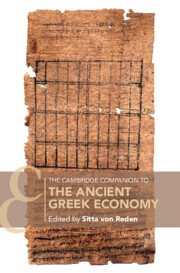Book contents
- The Cambridge Companion to the Ancient Greek Economy
- The Cambridge Companion to the Ancient Greek Economy
- Copyright page
- Contents
- Maps
- Notes on the Contributors
- Abbreviations
- Maps
- 1 Introduction
- Part I Diachronic Perspectives
- Part II Regional Perspectives
- Part III Structures and Processes
- 11 Population
- 12 Consumption, Nutrition, and the Grain Supply
- 13 The Agricultural Economy
- 14 The Non-Agricultural Economy: Artisans, Traders, Women, and Slaves
- 15 Markets
- 16 Money, Credit, and Banking
- 17 Dispute Resolution
- 18 Taxation and Tribute
- Part IV Networks
- Part V Performance
- References
- Index
- Cambridge Companions to the Ancient World
14 - The Non-Agricultural Economy: Artisans, Traders, Women, and Slaves
from Part III - Structures and Processes
Published online by Cambridge University Press: 21 July 2022
- The Cambridge Companion to the Ancient Greek Economy
- The Cambridge Companion to the Ancient Greek Economy
- Copyright page
- Contents
- Maps
- Notes on the Contributors
- Abbreviations
- Maps
- 1 Introduction
- Part I Diachronic Perspectives
- Part II Regional Perspectives
- Part III Structures and Processes
- 11 Population
- 12 Consumption, Nutrition, and the Grain Supply
- 13 The Agricultural Economy
- 14 The Non-Agricultural Economy: Artisans, Traders, Women, and Slaves
- 15 Markets
- 16 Money, Credit, and Banking
- 17 Dispute Resolution
- 18 Taxation and Tribute
- Part IV Networks
- Part V Performance
- References
- Index
- Cambridge Companions to the Ancient World
Summary
The non-agricultural economy of the ancient Greek world included crafts, trade, and services. Evidence for such, heavily biased towards Athens, is found via philosophical writing, comedy, forensic speeches, inscriptions, and archaeological finds. Elite attitudes, in which farming was the idealised citizen occupation, also impact the evidence. Nevertheless, at least 230 different terms for non-agricultural roles and occupations can be found in the sources (with many overlaps). Of these, fifty-three are for women. Workshops were generally small, with up to five or six craftsmen of low status, predominantly resident aliens (metics), freedmen or slaves. At least some rich citizens at Athens owned workshops, with a number of slaves perhaps able to live and work independently. Notable trades such as mining, marble-, bronze-, and metalwork, ceramics, and tanning seem to have clustered in common locations within cities and territories. Women’s non-agricultural economic roles seem to have been related mainly to textiles, retail of simple products, and provision of personal services.
Keywords
- Type
- Chapter
- Information
- The Cambridge Companion to the Ancient Greek Economy , pp. 202 - 220Publisher: Cambridge University PressPrint publication year: 2022
- 1
- Cited by

